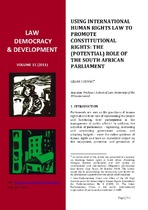| dc.contributor.author | Chenwi, Lilian | |
| dc.date.accessioned | 2019-10-07T11:54:24Z | |
| dc.date.available | 2019-10-07T11:54:24Z | |
| dc.date.issued | 2011 | |
| dc.identifier.citation | Chenwi, L. (2011). Using international human rights law to promote constitutional rights: The (potential) role of the South African parliament, Law Democracy and Development, 15: 311-338. | en_US |
| dc.identifier.uri | http://hdl.handle.net/10566/5008 | |
| dc.description.abstract | Parliaments are guardians of human rights due to their role of representing the people in the management of public affairs. The activities of parliaments cover the entire spectrum of human rights and have an immediate impact on the enjoyment, protection and promotion of rights. n South Africa, the Constitution requires parliament to scrutinise and oversee government actions, thus providing it with the opportunity to promote human rights. In addition, a number of principles guide the South African parliament in carrying out its mandate. These include advancement of human rights, human dignity, equality, social justice, accountability, responsiveness and openness.
This article considers the (potential) role of the South African parliament in promoting constitutional rights through ensuring compliance with IHRL. A key obligation in various IHRL treaties is the obligation to adopt laws and other measures to give effect to the rights in the treaties. As the legislative arm of government, parliament has a significant role to play in ensuring compliance with this obligation. | en_US |
| dc.language.iso | en | en_US |
| dc.publisher | Law, Democracy & Development | en_US |
| dc.subject | International human rights law | en_US |
| dc.subject | Parliament | en_US |
| dc.subject | South Africa | en_US |
| dc.subject | Constitutional rights | en_US |
| dc.title | Using international human rights law to promote constitutional rights: The (potential) role of the South African parliament | en_US |
| dc.type | Article | en_US |

